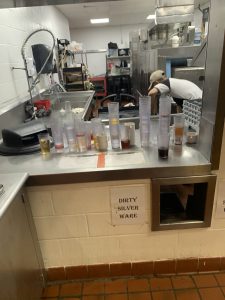I think the dining commons are a good example of a place on campus where waste is ushered out of site and concealed. The work of both the cooks and the dishwashers is hidden from view, and the experience of the students eating there is that they get their plate of food, and then drop their plate off with all the others when they leave. I know from experience working in restaurants that a lot of food ends up getting thrown out before it is even served. If, at the end of the meal, some food was left unserved, they may not serve it at another meal but instead throw it out. I don’t know if this happens at Hampshire (because it is usually done discreetly), but I assume that it might. In my experiences working in food service, uneaten food would be stored in a walk in fridge for a couple of days, and, after a certain amount of time passes, would be thrown in the trash, which is taken to the dumpster at the end of the night. This process is not visible to anyone but the food service workers, and is not openly talked about because of the negative associations with wasted food. Also, the food waste and messes left by students after they have eaten are the responsibility of the dishwashers, who do their work in a private room out of view of the students who are eating there. We don’t have to think about the nastiness of their job or make an effort to streamline their process by cleaning our plates as best we can ourselves, or even, in some cases, categorizing our eating utensils when we drop them off to be washed. The extent of the wasted food is unknown to students (myself included), because it is disposed of discreetly and picked up by waste workers later on.
